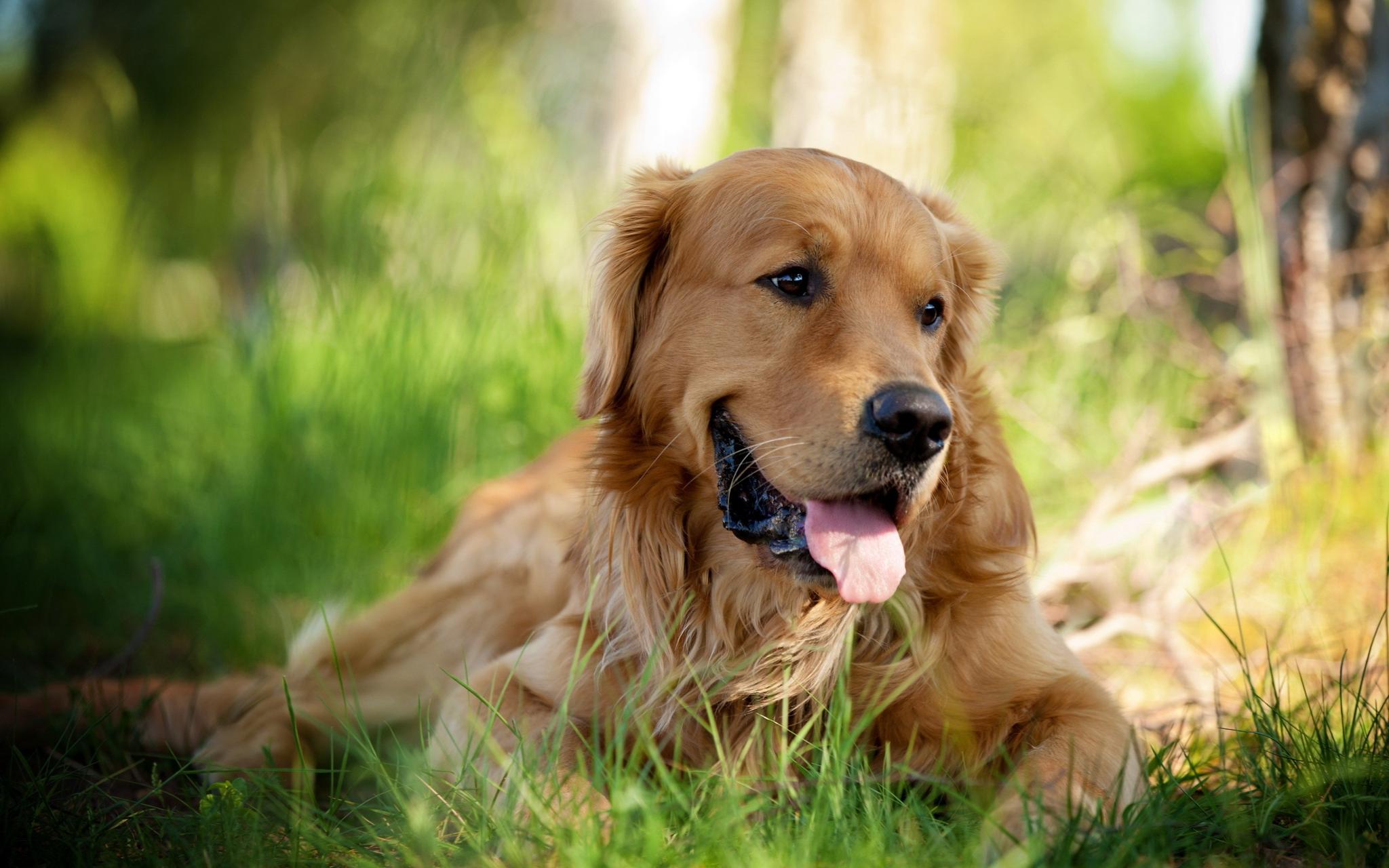Do Golden Retrievers Calm Down?
I have always been fascinated by Golden Retrievers. Their wagging tails and big grinning faces make me want to scoop them up and take them home with me! But, as much as I love their playful nature, I often wonder, do Golden Retrievers calm down?
Well, I dug a little deeper and found some interesting information that I want to share with you. In this article, we will explore the temperament of Golden Retrievers, their behavior as puppies, how they shift into adulthood, the impact of training, and the factors that affect their calmness.
We will also discuss some settling techniques and tips that can help your furry friend find their Zen. So, if you’re curious about whether your Golden Retriever will ever calm down, keep reading. Let’s dive in and see what we discover!
Golden Retriever Temperament
Golden Retrievers are known for their friendly, loyal, and playful nature. They have a naturally calm temperament that makes them great family pets. They love to be around their humans and are always eager to please.
They are intelligent dogs and respond well to positive reinforcement training. With early socialization and regular exercise, you can help your Golden Retriever maintain a happy and positive temperament. Overall, their loving and gentle nature makes them excellent companions for adults and children alike.
Puppy Behavior and Energy Levels
When it comes to puppy behavior and energy levels, Golden Retrievers are known to be quite energetic and playful. They are active and curious beings that need plenty of exercise and mental stimulation to keep them happy and healthy.
Puppies tend to have a lot of energy, and Golden Retriever puppies are no exception. They love to run around, chase after toys, and explore their surroundings. This is a natural part of their development, and it’s essential to provide them with enough opportunities to burn off their energy and satisfy their curiosity.
It’s also important to keep in mind that puppies have a shorter attention span and may get easily bored, which can lead to destructive behavior. Therefore, it’s important to provide them with plenty of interactive toys and engage them in various activities throughout the day.
As your Golden Retriever puppy grows, their energy levels will start to settle down, but it’s still essential to provide them with enough exercise and stimulation to prevent boredom and unwanted behavior. A tired puppy is a happy puppy!
Overall, understanding your puppy’s behavior and energy levels is crucial to ensure that they are happy and healthy. By providing them with plenty of exercise, stimulation, and attention, you can help your Golden Retriever puppy grow into a well-behaved and well-adjusted adult dog.
Adulthood Shift in Behavior
As golden retrievers enter adulthood, there is usually a shift in their behavior, which can affect their energy levels and overall temperament. While puppies are naturally more hyperactive and excitable, adult golden retrievers tend to become calmer and more peaceful.
As they mature, they also tend to become more independent and less reliant on constant attention and entertainment. This doesn’t mean that they won’t still require attention and physical activity, but their need for it will be less intense than when they were younger.
However, it’s important to keep in mind that not every golden retriever will follow the same pattern of behavior. Some may be more stubborn and require extra training to help them relax, while others may maintain their high-energy levels well into their adult years.
Overall, it’s important to understand your golden retriever’s individual temperament and adjust your training and attention accordingly as they transition into adulthood.
Training Impact on Calmness
Training is an essential factor that impacts a Golden Retriever’s calmness significantly. Proper training helps your pet to learn how to behave in different scenarios and makes them more relaxed and confident. It also helps to establish a strong bond between the owner and the dog.
One of the primary benefits of training is that it helps to reduce a puppy’s overexcitement and hyperactivity by teaching them commands such as “sit” or “stay.” This can be done through positive reinforcement training, which rewards puppies for desirable behaviors rather than punishing them for unwanted behavior.
Moreover, socialization training teaches dogs how to interact with other pets and humans, reducing anxiety and fear, contributing to a more calm and collected disposition. When a dog is well-behaved, it helps to prevent them from getting into fights or engaging in other behaviors that can lead to stress or injury.
In summary, the impact of training on a Golden Retriever’s calmness is significant, and it’s important to start training your pup as soon as possible for optimal results. A well-trained dog is not only enjoyable to be around but also helps to reduce stress levels for the owner themselves.
Factors Affecting Calmness
There are several factors that can impact a golden retriever’s level of calmness. Genetics play a crucial role, but environment, training and overall health can also affect their behavior.
A calm environment can lead to a calmer dog. Loud noises, an unstructured home and high-energy people can all increase a golden retriever’s anxiety levels. On the other hand, a stable and peaceful environment can help them stay calm and relaxed.
Training also plays a significant role in developing good behavior and overall calmness. Positive reinforcement training is an effective method for teaching golden retrievers to remain calm, even in stressful situations. Consistent training and socialization can also help.
Lastly, good health and proper nutrition can impact a golden retriever’s level of calmness. A healthy dog is a happy dog, and providing them with the right food and exercise routine can make all the difference in their behavior.
Golden retrievers are known for their gentle and calm demeanor, but it’s important to remember the factors that go into achieving this behavior. By providing a calm environment, effective training, and optimal health, owners can help their golden retrievers remain calm and relaxed.

Settling Techniques and Tips
Settling Techniques and Tips are essential to calm your Golden Retriever. When your pup is restless, you need to take appropriate steps to get them to relax. Here are some simple settling techniques and tips that you can use:
- Create a Relaxing Environment: Your pup needs a comfortable place to sleep and relax. Make sure you provide a cozy bed, a quiet surrounding and keep them in a comfortable temperature.
- Exercise: Regular exercise for your pup helps them to release their pent-up energy. Take them out for a walk or a run in the morning or evening, and you’ll see a significant shift in their behavior.
- Mental Stimulation: Mental stimulation is as important as physical exercise. Practice obedience training, play games like fetch or hide and seek, and give them interactive toys like treat-dispensing puzzles.
- Calming Treats: Some dogs respond well to calming treats. These treats contain natural ingredients like chamomile, which has a relaxing effect on your pup. However, we suggest consulting your vet before using any such treats.
- Calming Music: Playing calming music can have a calming effect on your pup. Studies have shown that classical music can have a calming effect on dogs.
Remember, it’s essential to be patient and consistent when trying to calm your pup. Using these settling techniques and tips persistently will help your pup relax and calm down.
Conclusion
In conclusion, golden retrievers do calm down with age, and proper training and care. As puppies, they have high energy levels and require ample exercise and attention, but as they grow into adulthood, their behavior shifts towards a more relaxed state. Quality training can also impact their calmness and behavior positively. It’s important to consider external factors that may affect a golden retriever’s calmness, such as environmental stress, health, and diet.
As a pet owner, it’s crucial to learn settling techniques and tips to help your furry friend relax when needed. With love, patience, and understanding, your golden retriever can transition from a lively pup to a calm and loving companion. Whether you’re looking for a new furry friend or already have one, know that with time, effort, and dedication, your golden retriever can reach an ideal level of calmness while still maintaining their fun-loving nature.


